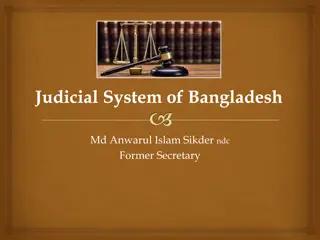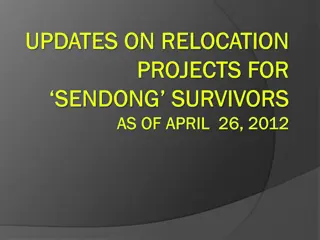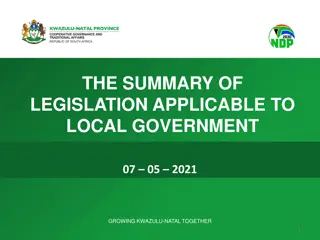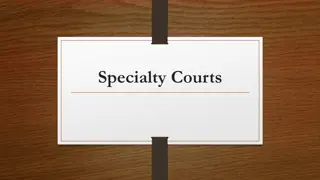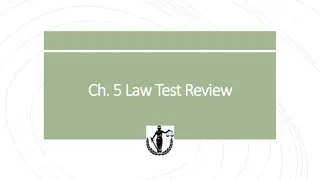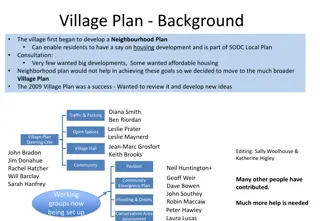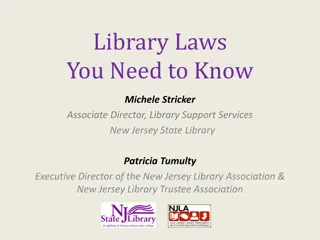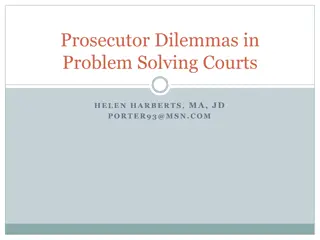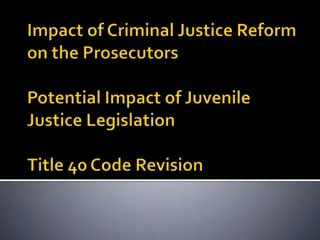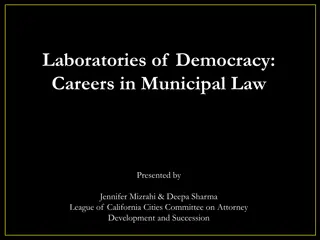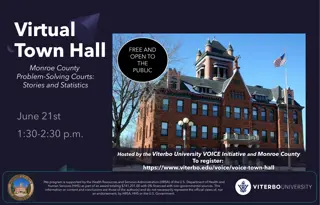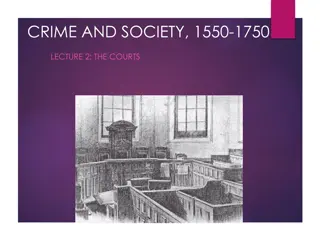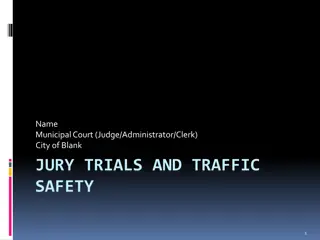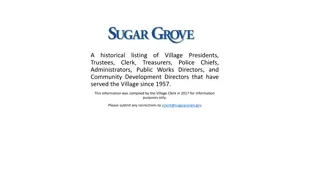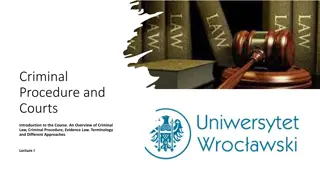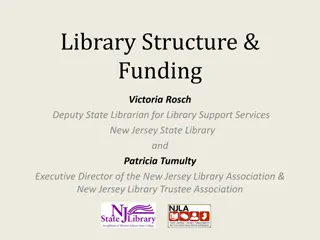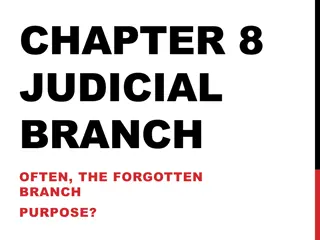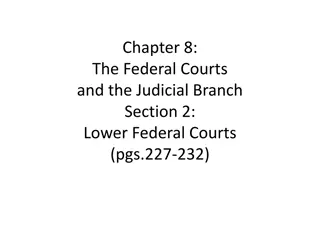Understanding the Role of Town and Village Courts in Municipal Governance
Explore the historical significance and impact of Town and Village Courts on municipal boards, focusing on the balance between branches of government, the importance of Justice Courts to constituents, and tips for enhancing relationships between municipalities and justice courts.
Download Presentation

Please find below an Image/Link to download the presentation.
The content on the website is provided AS IS for your information and personal use only. It may not be sold, licensed, or shared on other websites without obtaining consent from the author. Download presentation by click this link. If you encounter any issues during the download, it is possible that the publisher has removed the file from their server.
E N D
Presentation Transcript
TOWN AND VILLAGE COURTS: WHAT DO THEY DO AND HOW DO THEY IMPACT MUNICIPAL BOARDS? CREATING A BALANCE BETWEEN TWO SEPARATE BUT EQUAL BRANCHES OF GOVERNMENT 2023 ASSOCIATION OF TOWNS CONFERENCE PRESENTATION BY HON. BARBARA SEELBACH, CLINTON TOWN JUSTICE AND NYSMA 3RDVICE PRESIDENT OF THE NEW YORK STATE MAGISTRATES ASSOCIATION
TODAY YOU WILL LEARN: A brief history of the Town and Village Courts Why Justice Courts are important to our constituents Who we are today Maintaining the separation of powers doctrine The complex roles of the courts Tips to improve the relationship between municipalities and justice courts
HISTORY OF THE JUSTICE COURTS 3 Justice Courts have been in existence since the first permanent European settlement in the early 17th century 1777 and 1821 Constitutions provided state court structures, BUT left local courts unchanged In 1846, the State established a separate article of the State Constitution to govern the Judiciary, BUT gave express constitutional provisions that authorized the continuation of town justices
HISTORY OF THE JUSTICE COURTS 4 1950 s Tweed Commission proposed county-level district courts 1960 s -several attempts at constitutional amendments 1970 s Dominick Commission attempted to abolish village courts and take away trial jurisdiction 1980 s, 1990 s and 2006 NYS Bar Association push to abolish the T&V courts They existed in England before the discovery of America They have been in existence for over 300 years
WHY DO CONSTITUENTS FAVOR TOWN AND VILLAGE COURTS? 5 They existed in England before the discovery of America They have been in operation for over 300 years (if it ain tbroke, don t fix it) Constituents want to exercise control over their own localities The cost of local courts is minimal in comparison to state run courts
WHY DO CONSTITUENTS FAVOR TOWN AND VILLAGE COURTS? 6 Because they are regarded as of great importance to the people at large as it opens the doors of justice near their own homes, and not only affords a cheap and speedy remedy for minor grievances as to rights of property, but also renders substantial aid in the prevention and punishment of crime. Howland (155 NY[9 EH Smith] at 275-276).
7 Justice Court Fun Facts Nearly 1,300 Town and Village Courts Nearly 2,200 judges throughout the State of New York Justice Courts hear nearly two million cases per year
Basic Roles of the Justice Court Judge is responsible for applying the law, as enacted, in a fair and impartial manner. In other words, judges cannot arbitrarily make decisions that counter the applicable law Judge must follow the statutory rules and guidelines established for fair and impartial adjudication
Basic Roles of the Justice Court Courts must interact with multiple State, County and Local Agencies/Departments in fulfilling its duties Must keep up with increased Technology and Educational Demands. Judges are REQUIRED to complete at least 12 hours of CJE credits each year. Court Clerks are REQUIRED to complete 6 hours of CCE training each year.
Town and Village Courts: How important are they? 10 T&V Justices comprise the largest group of judicial officials in New York T&V Justices are on call 24/7 to arraign Defendants T&V Justices have the power to issue orders of protection and certain emergency orders when Family Court is not in session
Town and Village Courts: How important are they? 11 Conduct bench trials Conduct jury trials Power to punish contempt of court Issue arrest, bench and search warrants Solemnize marriages Administer oaths, limited authority to take acknowledgements
12 So what do Justice Courts do? We have limited, but very broad jurisdiction Criminal Criminal PENAL LAW Civil Civil CIVIL PRACTICE LAW (CPLR) SMALL CLAIMS Other Other SUMMARY PROCEEDINGS GENERAL BUSINESS LAW CRIMINAL PROCEDURE LAW MISDEMEANORS ARRAIGNMENTS Money actions that do not exceed $3,000 AG & MKT LAW ZONING ORDINANCES VTL ENCON LAW SOCIAL SERVICE LAW MENTAL HYGIENE LAW
13 JUSTICE COURT RESPONSIBILITIES Administer justice and maintain separation of powers in accordance with the Constitution Must apply applicable statutes and court rules: UJCA, Judiciary Law, CPLR,CPL, RPAPL, VTL, GML Every T&V Justice and every local official must share responsibility for the effectiveness of T&V Courts
THE THREE SEPARATE BUT EQUAL BRANCHES OF GOVERNMENT 14 EXECUTIVE LEGISLATIVE JUDICIARY When one branch of the triangle breaks, the triangle collapses
THE THREE SEPARATE BUT EQUAL BRANCHES OF GOVERNMENT 15 The U.S. Constitution and the N.Y.S. Constitution both require that no single branch of government be allowed to dominate the others. This ensures that each branch of government can check and balance each other. Each branch has distinct obligations and functions
THE JUDICIARY BRANCH Town and Village Justice courts must operate free from undue interference from executive and legislative branches.
THE JUDICIARY: A SEPARATE BUT EQUAL BRANCH OF GOVERNMENT Municipal Boards: Fund local courts (salaries, education) Determine level of security (raised bench, alarms, magnetometer, court officer) Create court clerk positions (including hours worked, full/part-time)
DUTIES OF THE MUNICIPAL BOARD 11 Must assure that each branch of government can fulfill its responsibilities in the balanced way our Constitution requires. Under the Constitution, all courts must operate free from any undue influence or interference from both the executive and legislative branches. Consistent with their home rule powers, town and village boards must administer their local courts consistent with the principles of judicial independence and the separation of powers All municipal officers are sworn to uphold these principles
The Role of Municipal Boards Establish the Operating Budget for the Court (with the advice and recommendation of the Judges. Consider what has changed! Employ/discharge Court Clerks (with the advice and consent of the Judges) Establish the Salaries for Judicial and Non-Judicial Personnel (with the advice and recommendation of the Judges) Consider what has changed! Financial Audits and Reviews (UJCA 2019-a) - Yearly Insurance Coverage Undertaking/Employee Dishonesty
Duties of the Board: Adequately Budget for their Courts Provide Suitable Court Facilities Pay for necessary Training and Travel expenses for their Justices and Court Clerks (mandated by the State) Establish and Pay Appropriate and Rational Salaries to their Justices and Court Clerks
Board Members cannot: Attempt to influence Justices on matters concerning their judicial roles and responsibilities Engage in any Ex Parte Communications in any form Expect that local revenues are a relevant factor in determining case decisions. Courts must not be viewed as revenue generating entities.
Board Members must not: Board Members must not inquire or communicate with the court about cases brought or pending before the court Courts must be allowed to operate free from undue influence or interference from the Town or Village Board
Town and Village Justices must not: 23 Participate in the governmental affairs of town or village government Attend department head meetings Must not discuss current cases pending before the court Must not discuss the setting of fines and fees or discuss generation of revenue with the board
Remember: 24 Justices are subject to a different set of laws and constitutional principles than other branches of government. Therefore, when issues between the branches of government arise, they must seek assistance from the Office of Court Administration, while the Board may seek advice from their municipal attorney, The Association of Towns or The Conference of Mayors
25 OFFICE OF COURT ADMINISTRATION: WHO ARE THEY AND WHAT DO THEY DO? OCA is responsible for helping justice courts keep their autonomy from their town or village.
26 HOW DO THEY DO THAT? By providing computers, email systems, online databases and other resources at no cost to the municipality By providing JCAP grant monies to the courts encourage your Judges to participate!
27 WAIT: SO ARE MUNICIPALITIES IN CHARGE OF JUSTICE COURTS OR NOT? WELL, IT DEPENDS. Justice Courts are subject to limited oversight by the local town or village board. The Chief Judge and Chief Administrative Judge have some administrative control over the Justice Courts
BUT 28 Local courts are generally outside the OCA s day-to-day oversight Each town or village court and their respective municipality is responsible for the operational management of the justice court In other words, town and village courts are their own independent administrative entities
Justice courts are the only courts where fiscal oversight rests with the court and the justice Each justice court, not the state or municipality, sets their court hours, court clerk practices, security procedures and operational procedures without OCA oversight Justice courts routinely hold proceedings during evenings, weekends and overnight, whereas state courts do not HOW ARE JUSTICE COURTS DIFFERENT FROM STATE COURTS? 29
COURT HOURS Section 214.2 (b) of the Uniform Rules for the Justice Courts states: Each court shall establish the days and time when it will sit. The schedule shall be filed with the clerk of the municipality and the clerk s office shall be open at hours established by each court.
COURT BUDGETS 31 Town and Village boards have a duty to adequately budget for their courts Boards are responsible for ensuring their courts have sufficient personnel and the funding needed to faithfully discharge their duties Boards must budget in a way that does not undermine judicial independence or subvert the effectiveness of the justice court
COURT CLERKS 32 Municipalities have authority to set the general personnel and administrative policies for employees BUT, justices are responsible for hiring and terminating court clerks However, judges must secure approval from the board before hiring or terminating a court clerk
Duties of the Board and Compliance UJCA 2019-a Justice must present his records and dockets to the board to be examined annually Board is required to enter in the meeting minutes that the court records have been audited Board members are supplied with a checklist which is found in Appendix 10 of the JCF handbook Mayor or Supervisor is required to submit copies of the audit to the Chief Administrative Judge. OCA reviews these audits to see if further action is required
JUDICIAL SALARIES 34 Town and Village Boards have discretion to set judicial salaries, but there are limitations: Salaries cannot be reduced during the judge s term of office There cannot be arbitrary salary discrimination between justices
JUDICIAL SALARIES 35 T&V Boards have discretion to set judicial salaries, but there are limitations: Salary levels must not impede the effective operation of the court Salaries must be established and adjusted independent of judicial performance Salaries cannot be linked to inappropriate considerations such as court-generated revenue
Fiscal Responsibilities Only the Judgeis personally responsible for monies received by the court and is personally liable for lost or stolen money. The court is subject to the Fiscal Responsibility Guidelines established by the Office of the State Comptroller. See the Justice Court Handbook http://www.osc.state.ny.us/localgov/pubs/jch.pdf
COURTS MUST FOLLOW THE GENERAL RECORDKEEPING REQUIREMENTS: Maintain accurate and complete case files Maintain an index of all cases Maintain a cash book Maintain official bank accounts Issue acceptable receipt forms Deposit moneys within 72 hours of collection
COURTS MUST FOLLOW THE GENERAL RECORDKEEPING REQUIREMENTS: Make all disbursements by check (except for petty cash transactions) Submit monthly reports and remittances to JCF by the 10th each month Reconcile all bank accounts monthly Court Officials should be the only ones handling the money and issuing official receipts. Transmit dispositions in a timely fashion
UJCA 2019-a Compliance The Yearly Audit States that the Justice must at least once a year present their records and dockets to the board to be examined Board must enter in the minutes of its proceedings that the records have been audited Board members are supplied with a checklist which is found in Appendix 10 of the JCF handbook Mayor or Supervisor is required to submit copies to the Chief Administrative Judge. OCA reviews these audits to see if further action is required
UJCA 2019-a Compliance The Yearly Audit 40 Boards are required to perform the audit themselves May engage the services of an independent public accountant or CPA to conduct the audit In towns that have a town comptroller, the annual audit responsibility rests with them.
UJCA 2019-a Compliance The Yearly Audit 41 Board members are supplied with instructions and a checklist that provides them with the general tools to properly perform the annual audit
Board members must examine the following records: 42 Cash receipts records and supporting documents Cash disbursement records and supporting documents Bank statements and supporting documents Monthly reconciliations of cash book balances and bank balances Reports to applicable governmental agencies.
Judges can find the Monthly and Annual checklists for you in the Justice Court Fund Handbook (Appendix 9 & 10) https://www.osc.ny.gov/files/local-government/publications/pdf/justice-court-fund-handbook.pdf
45 Wrap up The relationship between municipal boards and justice courts can sometimes be tricky and complex. Communication between the two branches is the key to success. PDF COPY OF THIS PRESENTATION CAN BE DOWNLOADED FROM THE NYSMA WEBSITE AT: QUESTIONS? https://nyss://nysma. https://nysma.net/nysma.n et/
CONGRATULATIONS TO ALL NEWLY ELECTED OFFICIALS! 46 THANKS FOR HAVING US!


